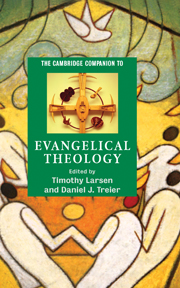Book contents
- Frontmatter
- 1 Defining and locating evangelicalism
- Part I: Evangelicals and Christian doctrine
- Part II: The contexts of evangelical theology
- 10 Evangelical theology and culture
- 11 Evangelical theology and gender
- 12 Race and the experience of death: theologically reappraising American evangelicalism
- 13 Evangelical theology and the religions
- 14 Evangelical theology in African contexts
- 15 Evangelical theology in Asian contexts
- 16 British (and European) evangelical theologies
- 17 Evangelical theology in Latin American contexts
- 18 Evangelical theology in North American contexts
- Index
10 - Evangelical theology and culture
from Part II: - The contexts of evangelical theology
Published online by Cambridge University Press: 28 September 2007
- Frontmatter
- 1 Defining and locating evangelicalism
- Part I: Evangelicals and Christian doctrine
- Part II: The contexts of evangelical theology
- 10 Evangelical theology and culture
- 11 Evangelical theology and gender
- 12 Race and the experience of death: theologically reappraising American evangelicalism
- 13 Evangelical theology and the religions
- 14 Evangelical theology in African contexts
- 15 Evangelical theology in Asian contexts
- 16 British (and European) evangelical theologies
- 17 Evangelical theology in Latin American contexts
- 18 Evangelical theology in North American contexts
- Index
Summary
Though the evangelical movement has become a diverse, worldwide movement, there has been consistency in attitudes toward culture. Throughout their history evangelicals have displayed ambivalence toward their cultural context. The world was either something to be won over in the name of Christ, or to be avoided as a source of temptation, but it could also represent a resource to be exploited in pursuit of their evangelical calling. As a result, their relationship with culture has been ambiguous, marked more often by vigorous campaigns against particular evils believed to threaten Christian living - whether liquor, polygamy or slavery, or, more recently, abortion and gay marriage - than by thoughtful engagement with the complexities of culture. In this respect views of culture reflect the unique historical and theological character of the movement, with its roots in the Reformation, and the revival and missionary movements emanating from Europe and North America. In this article we will use “culture” to refer to artifacts, practices, and institutions by which a people expresses its identity; in theological terms, what humans make of God's good creation.
- Type
- Chapter
- Information
- The Cambridge Companion to Evangelical Theology , pp. 145 - 160Publisher: Cambridge University PressPrint publication year: 2007

